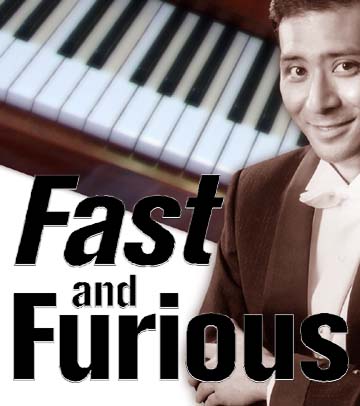
The Van Cliburn winner performs
here in a recital for Ellen Masaki
Soft-spoken and self-effacing, pianist extraordinaire Jon Nakamatsu is the kind of person you worry that someone will take advantage of. But in classical music circles, he's like the campus bully -- without the violence, that is.
The California native, who performs a piano recital tomorrow night, claimed a distinguished place on the international musical scene in 1997 when he was named the Gold Medalist of the 10th Van Cliburn International Piano Competition, the only American to have achieved this distinction since 1981.
Making music
Jon Nakamatsu performs in honor of Ellen Masaki:Where: Blaisdell Concert Hall
When: 7:30 p.m. tomorrow
Tickets: $15 to $57
Call: 792-2000
A former high school German teacher who's performed in Honolulu several times (and returns for a recital in honor of local teacher Ellen Masaki tomorrow night), the victory made Nakamatsu an overnight hero.
Six years after winning the Cliburn award, Nakamatsu's flame still burns. He performs nine months a year, mostly in the United States.
"After the Cliburn, I expected some die down, but I'm working as steady as ever," he said in a telephone interview from his San Jose home. "I'm very fortunate."
The magic of any concert pianist is in his hands, particularly the fingers, and none move faster and with more accuracy and purpose than Nakamatsu's.
"I probably don't practice as much as I should, but the traveling can make it very difficult," he said. "Late arrivals in a city and fatigue can get in the way of as good a performance as I might like."
Nakamatsu, who has been praised by the best and brightest symphony musical directors, including Honolulu's Samuel Wong, admits being his own worse critic. Asked to name one musical weakness, without hesitation, the pianist answers "Well, everything."
"I constantly doubt that I can actually do any of this," Nakamatsu says in a whisper. "Every time I perform, no matter how successful it is publicly or how good I feel, I never ever feel what I've done is a best.
"If I felt that way, I would stop performing; there wouldn't be anything more for me to do. It's much easier for me to be more frustrated than satisfied."
Performance anxiety hasn't hurt his demand.
This year, Nakamatsu had debuts with the Buffalo Philharmonic Orchestra and Berlin's Carl Philipp Emanuel Bach Chamber Orchestra, seven mainland city orchestras and a return to the Naples Philharmonic Orchestra. Among his recital appearances, he will appear at The John F. Kennedy Center for the Performing Arts in Washington, D.C., as part of the "Honors Series," celebrating past recipients of The Kennedy Center Honors.
Return engagements are the highest form of flattery for the musician.
"You don't really have a career if you play all the great places just one time," he said. "Returning lets you get to know the audience and the orchestra. It makes my playing stronger."
NAKAMATSU has studied privately with Marina Derryberry since age 6, has worked with Karl Ulrich Schnabel and studied composition and orchestration with Dr. Leonard Stein of the Schoenberg Institute at the University of Southern California. He's also studied chamber music and musicology.
Lately, Nakamatsu has been doing more chamber music performances, which he admits to "really, really liking."
"As a pianist, you can lead very independent lives and exist on your own for your entire career," he said. "But chamber music is the most social aspect of musicmaking and everyone is an equal partner. You work in a different way than with an orchestra.
"You have a greater responsibility to the group, and I find that to be a very rewarding experience."
Nakamatsu doesn't know if his playing is better than at the Cliburn.
"My goal after each concert is to assess what I do," he said. "I'm always listening to my concert tapes so I can work on it and take it a step beyond.
"It makes no sense for me to play the same program eight times and keep playing it the same way."
Nakamatsu likes to experiment with his repertoire.
"My best performances are where I feel so unencumbered that I can just try anything," he said. "These are performances that are my most successful."
When a performance doesn't work, it can be several things.
"A piano I hate, not feeling like being on stage that night, a work I've done too much, being out of synch with the audience," he said. "I am particularly sensitive to audiences."
His favorite audiences are those open to slight deviations in a piece.
"When that happens, I can feel an electricity with real communication through the music," he said. "I need the audience to react to what I'm doing and I know early on if they're with me or against me.
"When they're receptive, I'm the best I can be."
Click for online
calendars and events.

